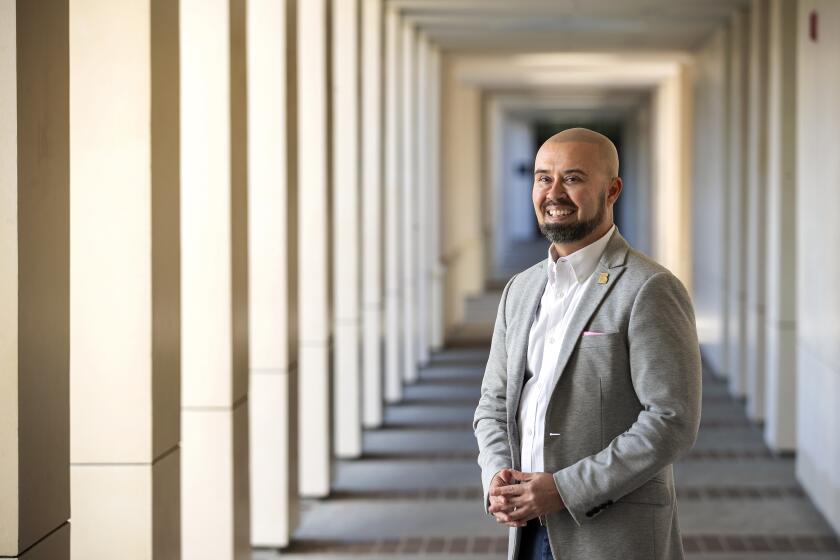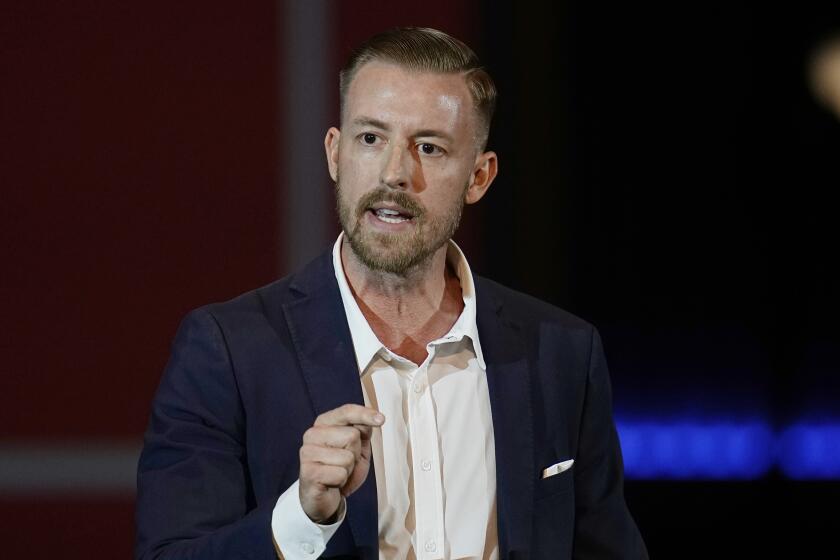Clinic settles lawsuits but still faces scrutiny over erectile dysfunction injections
At the headquarters of Boston Medical Group in Costa Mesa, six salesmen were working the toll-free appointment line on a recent afternoon, fielding calls from men around the country enticed by newspaper and radio ads promising a “proven” solution to erectile dysfunction in “one office visit.”
The results are visible “right there in the office,” one sales representative told a caller. “It’s amazing.”
Following a script, he answered a few questions and offered to schedule a $195 consultation at one of the company’s 21 U.S. clinics.
The marketing draws thousands of men to Boston Medical’s clinics each year. The medical reality can be less appealing.
Most customers learn only after they arrive for an appointment that the company’s primary treatment is a powerful mix of drugs that a man must inject into his penis each time before sex. The method, known as intracavernous pharmacotherapy, or ICP, is usually prescribed by urologists only when Viagra and other pills don’t work.
But Boston Medical discourages the use of oral medications in favor of injections, according to court records, company literature and interviews with former patients. It plays up the dangers of the pills and provides a “test” shot in the office. While the patient is still aroused, he is told that several months of regular use may be all he needs to regain natural function or prevent premature ejaculation.
Independent urologists — including authors of national and international guidelines for treating male sexual dysfunction — said there is no scientific evidence for either claim.
Patients aren’t told that most physicians get bonuses once they generate a minimum amount of business — 10% of every sale to new patients and 7.5% for returnees. Nor are patients told that the pharmacy that prepares the injections is owned by the company founder’s wife.
Boston Medical charges $1,500 for 60 doses, including any follow-up visits. The same type of injection is available by prescription elsewhere for as little as $2.80 a shot.
Although there are no publicly available statistics on complications from this type of injection, some of Boston Medical’s former patients allege in lawsuits that they have experienced permanent impairment after erections that lasted several hours — a medical emergency known as priapism.
A recent case in Georgia resulted in a multimillion-dollar award that Boston Medical officials said could bankrupt the company.
The founder, Dr. Quoc “Daniel” Ha, denied that the company has done anything wrong, saying that it has been a godsend for hundreds of thousands of men, that complications are rare and that competitors make similar claims.
Ha said that most patients would have already tried oral medications without success and that serious problems arise only when they don’t heed warnings or follow instructions.
“When patients come to see us, they’ve been through everything,” he said. “They come here in desperation.”
That desperation makes the marketing troubling, said Dr. Michael Grodin, a bioethics expert at Boston University. He said the company and its doctors are ethically obligated to describe the treatment options before patients pay for an appointment, to explain the risks and benefits and to disclose their financial incentives.
“You’re dealing with sex and impotence, which is a very sensitive subject for men,” he said. “They are a vulnerable, vulnerable population. They’re easily manipulated.”
At Boston Medical clinics, private waiting rooms have binders of articles about the dangers of Viagra and other pills — side effects that are extremely rare — and about their prohibition in certain heart patients, but no warnings about injections.
In a company operations manual introduced as evidence in a 2009 trial, doctors are encouraged to present the injection therapy as a potential “cure” for both erectile dysfunction and premature ejaculation.
The manual offers sales tips — “A confident manner in a salesman is like having money in the bank!” — as well as phrasing suggestions for “Getting People to Say Yes To You.”
Ha said the manuals were created to “impress potential investors” and were never used by the doctors. “They sit in the drawer to collect dust,” he said.
The treatment’s origin
In 1983, British doctor Giles Brindley made an unusual presentation at the annual meeting of the American Urological Assn. in Las Vegas.
According to physicians in the audience, he announced that he had just injected himself with a common drug used to expand blood vessels. Then, stepping out from behind the lectern, he dropped his pants and walked down an aisle offering people the chance to see the results. Urologists everywhere were soon training patients to inject themselves with various compounds of so-called vasodilators.
Ha, a young doctor, saw a business opportunity.
He was already a self-made man. In 1981, at age 17, he fled his native Vietnam and spent two years in a refugee camp in Thailand before being resettled in Australia, where he earned a medical degree.
Ha said he helped another doctor there open erectile dysfunction clinics before taking the idea abroad. The first U.S. clinic opened in Costa Mesa in 1998, the year Viagra was introduced. Ha correctly predicted that the marketing campaign around Viagra would drive many men to seek treatment for the first time.
There has never been a Boston clinic. Ha said investors chose the name for its “credibility.”
Most of the clinics are independent corporations managed by Ha’s company. In its best years, Ha said, his company earns a profit of about $1 million.
The company pays him $30,000 a month, he said in a 2008 deposition. He said he and his wife, Kim Tran, earn little from her Las Vegas pharmacy and his stake in some of the clinics.
Over the last decade, Ha has collected more than a dozen properties in Orange County, including two houses for which he paid more than $1.5 million each, property records show.
Lawsuits settled
The enterprise has been targeted in lawsuits.
In a 2003 case in Texas, a man in his 30s said he was not properly warned of the dangers of priapism and so he waited more than a day to seek help from the doctor, who has since left Boston Medical. He ultimately underwent surgery but said he was left impotent, worse off than when he initially sought treatment.
In a 2006 case in Illinois, a man in his 50s was advised by phone to continue injecting himself even after reporting several instances of priapism and an indentation on his penis, according to his lawsuit. The incidents led to a debilitating deformation, according to Dr. Laurence Levine, a urologist who performed surgery in an attempt to correct the problem.
Both cases ended in confidential settlements.
Other men simply sought refunds. One in his 20s was already taking the oral medication Levitra — with good results — when an advertisement brought him to the Philadelphia clinic. “They made it sound like they had a miracle drug, 100% proven,” said the man, who spoke on condition of anonymity. “The stuff you want to hear.”
He ultimately got a refund, he said, to resolve a claim alleging in part that he had priapism for eight hours after his first injection.
The highest-profile case involves a 50-year-old truck driver named John Henry Howard who waited 36 hours before seeking help for priapism and experienced some loss of function.
In a 2009 trial in Atlanta, he said he had not read information he received explaining what to do in the case of priapism.
The jury concluded that Howard had been fraudulently misled about his options and the risks, and awarded him $9.25 million in punitive and compensatory damages. That was reduced to $7.8 million and is now under appeal.
Howard testified that he had not tried oral medications before seeking treatment at Boston Medical. Several urologists who have treated former Boston Medical patients said in interviews that they have seen many cases in which men were given injections they didn’t need.
Ha dismissed criticism from urologists, saying it was part of a battle over who should treat male sexual problems.
Just three of the 18 Boston Medical doctors on the company website are urologists, according to a review of their licenses.
In three cases, doctors were hired despite questionable histories. Dr. Rajesh Puri, a pediatrician who runs the Washington, D.C., clinic, had been caught fraudulently billing Medicare for several years. In Philadelphia, Dr. Gregory McGinley was accused of having an affair with a female patient. Both men, who declined to comment for this article, had their medical licenses revoked but later reinstated.
Dr. John Fina, 66, said he was hired to run the Seattle clinic after recovering from a “hellish” addiction to pain medication — and after being disciplined by state health authorities.
Some doctors, such as 67-year-old Houston allergist Daniel Tuft, were simply looking for less stressful work without the hassle of dealing with insurance companies.
Although he occasionally prescribes pills, Tuft acknowledged that financial incentives favor the sale of injections. He said those incentives do not affect his medical judgment.
Tuft said a few of his patients each year suffer from priapism, but only once did it cause lasting damage — to a man who waited too long to seek help.
More to Read
Start your day right
Sign up for Essential California for news, features and recommendations from the L.A. Times and beyond in your inbox six days a week.
You may occasionally receive promotional content from the Los Angeles Times.







